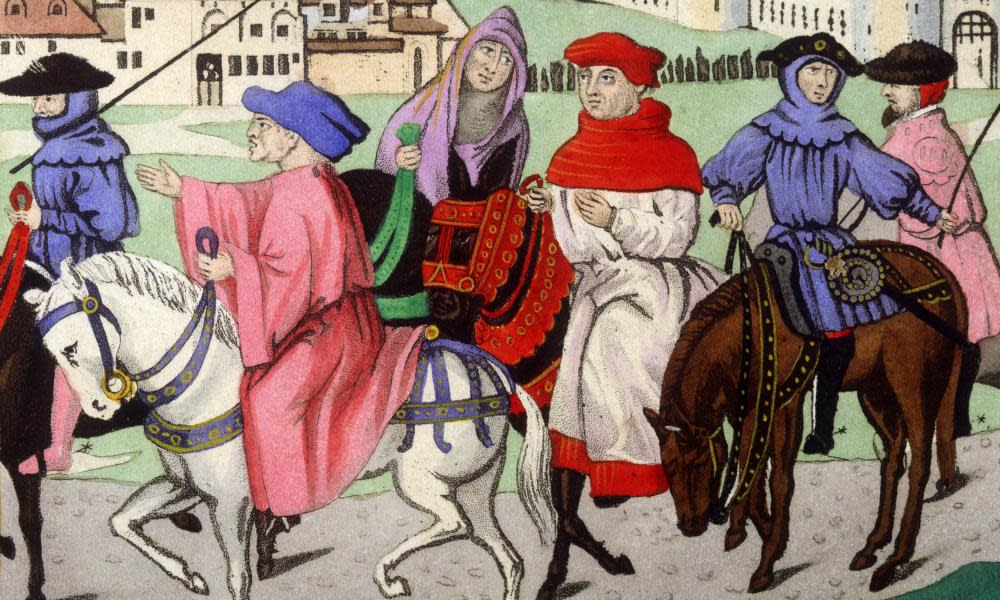Pilgrims by Matthew Kneale review – a slyly comic medieval journey

Matthew Kneale will probably always be best known for the award-winning English Passengers, his exuberant polyphonic novel in 21 voices. Interweaving a 19th-century British seafaring expedition in search of the garden of Eden with a vicious episode in Australian colonial history, it dramatised the clash between faith and science, empathy and self-interest.
Two decades on, his new novel tracks another journey: that of a motley group of 13th-century pilgrims, banding together for safety on the road from England towards Rome. A landowner has been ordered to make the trip after fighting over territory with a local abbot, but most are following the prickings of their own conscience or wanderlust, as well as hoping to win reduced time in purgatory. Constance fears her adultery has brought down sickness on her young son; her freeloading sister is along for the ride. Oswald has made a career of performing pilgrimages for the souls of the dead. Margaret wants more souvenir pilgrim badges for her hat. And Tom son of Tom, a poor village lad, hopes “good Saint Pete” will intercede with God on behalf of his dead cat, which has been appearing in his dreams with purgatorial fires licking at its fur. His family are happy enough to see him go; there’ll be more room in the shared bed.
There’s a sly, humane comedy in the way Kneale ventriloquises both the stranglehold of religious law on daily life and thought and the endlessly inventive individual efforts to exploit and interpret it. Warin, a tailor seething with class resentment against “false priests and rich leeches”, is escorting his daughter Beatrix, who has dodged her chore of cleaning out the chickens by becoming “God’s mouthpiece”, producing divine commandments in a croaky voice. She has a message for the Pope: “The fiend walks among you in Margate.” Two pilgrim portraits are based on historical figures: Matilda Froome, an enterprising religious hysteric for whom a romance with Jesus is preferable to domestic drudgery, and Lucy de Bourne, a very merry widow seeking a divorce on the grounds of consanguinity (“all the gentle folk of Lincolnshire were cousins … it only counted when you wanted to divorce one”). Lucy’s sin first, pray later attitude is enabled by a pet priest to whom she can confess privately rather than having to do it out loud in church, and her gossipy tour of the intricacies of medieval marriage law is fascinating.
When they finally make it to Rome, Constance remarks that St Peter’s is 'very fine, but Norwich is longer, don’t you think?'
Linguistically, Kneale treads lightly, with a chatty, modernised version of medieval English that slips down easily (inevitably, as he says in the afterword, a “compromise”). In his sections, Tom is a convincing and vigorous guide to his fellow pilgrims – showing us “a little stick of a fellow and a big marrow of a thing ... A break-chest of a fellow, a tall leek of a boy” – but there is little variation in the other six voices. This stands in stark contrast to the linguistic invention unleashed in English Passengers, or indeed in James Meek’s recent pilgrimage tale, To Calais, in Ordinary Time, which parsed the medieval world through three different registers: peasant, clerk and noblewoman.
Kneale’s aim is immediacy and recognition, and he brings the characters as close as possible with much millennium-spanning humour. There’s a running joke about the disappointments of travel; when they finally make it to Rome, Constance remarks that St Peter’s is “very fine, but Norwich is longer, don’t you think?” (Kneale’s previous book was a history of Rome, and here he shows us the hectic medieval city, loomed over by ruins “like the bones of a huge dead beast”.) The characters all share a down-to-earth, proto-Canterbury Tales worldview; the religious ecstasies of Matilda the mystic are entirely played for laughs, and some episodes, particularly a night in a nunnery (“It’s only a bit of kissing”), veer into the realm of the romp.
But by the book’s ending, the broad comedy and easy cohesion of the central characters – a Merrie England in miniature – are revealed as artful choices. Their pilgrimage is bookended by persecution, a structural counterpoint that casts the main narrative in shadow and exposes the seam of prejudice running through our national story. The first chapter, set 25 years earlier in 1264, is narrated by a Jewish woman amid “the new troubles” of the second barons’ war, when anti-Jewish sentiment was weaponised into massacres. In Tom’s final chapter, the pilgrimage is over; virtue has been rewarded and malice punished, and the narrative loose ends tied up with jaunty bows. And then we glimpse, just in passing, the beginning of Edward I’s expulsion of Jews from England – a sad procession along a country lane. Earlier in the novel, a central episode had suggested that shared experience can vanquish fear of the other: “What does it matter what religion they have when their souls are kindly?” These pilgrims are, mostly, kindly, and Kneale makes them excellent company. But they still spit, or smirk, or stay silent when the carts of Jews go by.
• Pilgrims by Matthew Kneale is published by Atlantic (RRP £16.99).


